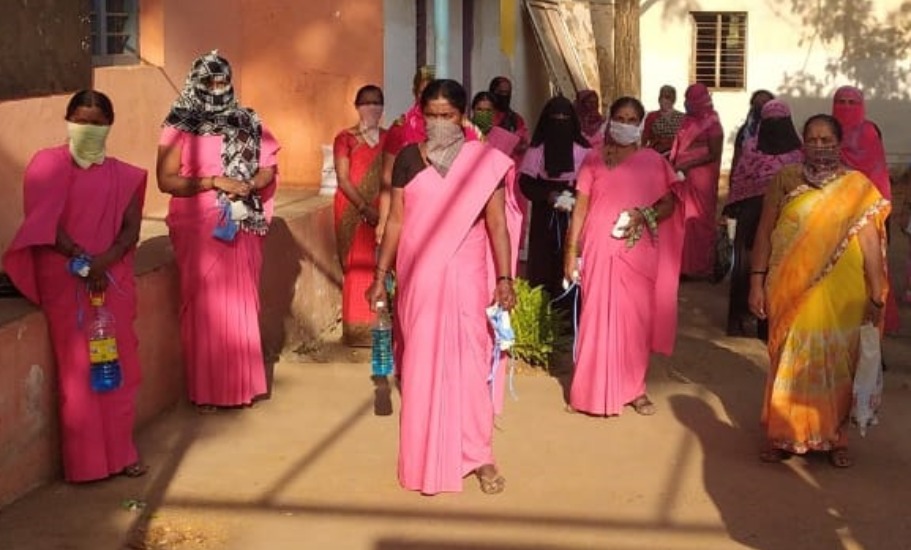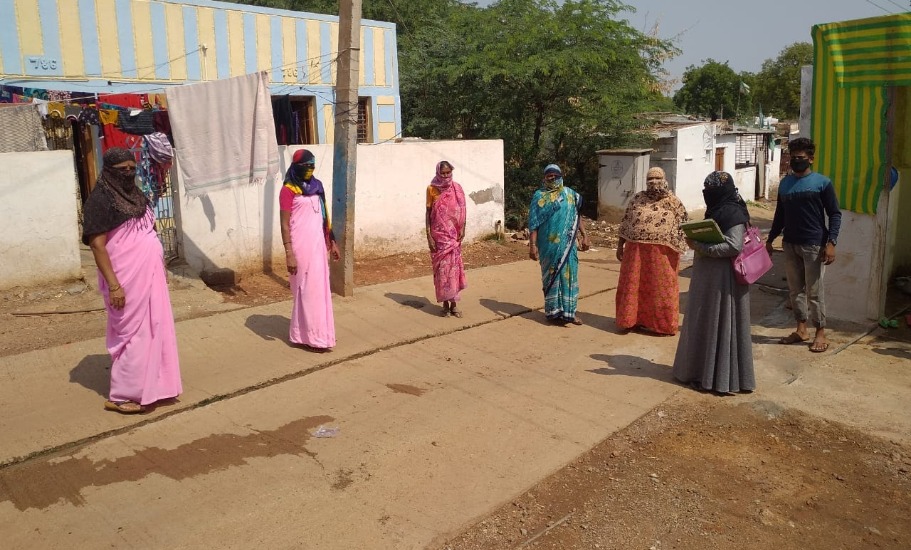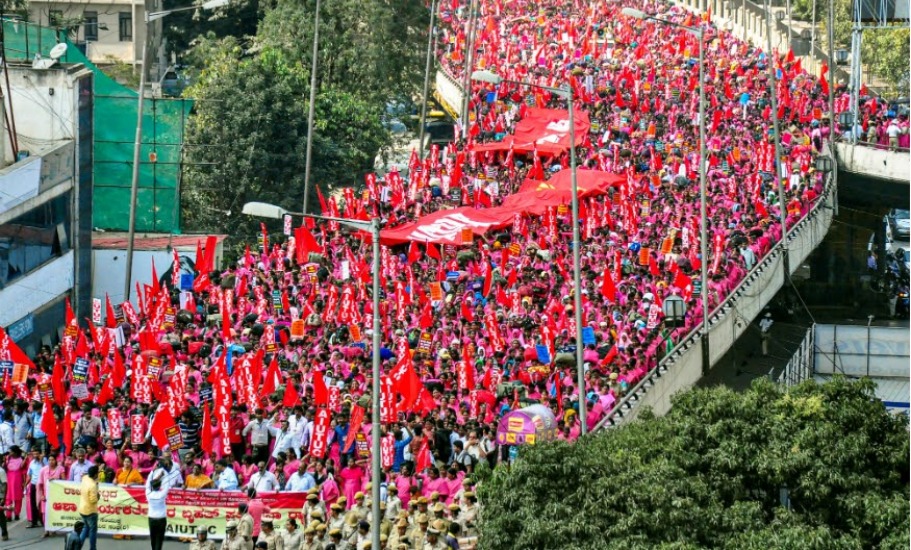
ASHA workers fight on COVID-19 frontiers with no incentives, safety
The ASHAs are the largest group of health workers with more than nine lakh workers in India. But the workforce at the primary level, who provide service at health posts and community level, are unarguably the most neglected.

Laxmi (name changed), a 34-year-old Bengaluru-based Accredited Social Health Activist (ASHA), is concerned the deadly coronavirus could end up taking her life, and that of lakhs of ground-level health workers like her.
“We have to go out day and night to protect people from coronavirus. But while doing our work, we feel this virus will take our own lives,” she says. “What if we meet an infected person someday and the infection is transmitted to us? We are sent on the ground (by the health department) without any safety equipment. We use only our handkerchiefs as masks.”
Laxmi says she cannot afford a mask since she needs that money to feed her family. She has not even received her entire salary for the last 15 months, and now buying a mask is an additional burden for her. “I am ready to take the risk to feed my children and for the sake of the society. I am ready to risk my life if I can save thousands others,” she adds.
The ASHAs are the largest group of health workers with more than nine lakh workers in India. But the workforce at the primary level, who provide service at community level, are unarguably the most neglected. As health workers across the system have been mobilised to respond to the crisis, the pre-existing cracks and weaknesses in the system have made it all the more fragile.
ASHAs are making door-to-door visits in this time of a pandemic as they have been deployed by the government to conduct surveys in localities and collect data on people having cough, cold and fever symptoms. But frontline healthcare workers like them are not being provided with the basic protective equipment like masks, gloves, etc. by the health department.

Nagalakshmi R, the Karnataka Asha Union state secretary, told The Federal the ASHAs are doing a commendable job in Karnataka to prevent the spread of the virus, but the health department did not provide a majority of them with masks, sanitisers and other basic safety equipment. They visit thousands of houses each day and they are more prone to contracting the disease, but the government is not giving attention to them, Nagalakshmi added.
Three public health non-governmental organisations (NGOs) — Jan Swasthya Abhiyan (JSA), All India People’s Science Network (AIPSN) and Public Services International India National Coordination Committee (PSI India NCC) — have jointly said the health workers at the community level, such as ASHAs, are facing a higher risk of exposure to the virus since the availability of personal protective equipment (PPE) is poor and uneven across regions and hospitals.
Moreover, health facilities can also become sources of the spread of infection as was recently seen in Mumbai, and Hyderabad. Hence, the rights and protection against the risk of health workers on one hand, and the robustness of the health system on the other, and the policies with regard to testing: all deeply intersect in the times of COVID-19, added the NGOs.
However, the Bruhat Bengaluru Mahanagara Palike (BBMP) has rejected the allegation by the ASHAs. Dr Kalavathi Devi AC, reproductive and child health officer, BBMP, who is dealing with ASHAs right now, said within the limits of BBMP, every single ASHA has been provided with a mask and basic safety equipment. “I don’t know about other areas but BBMP has provided every ASHA with a mask,” she said.
But this is not the only problem being faced by the workers who have made the National Health Mission (NHM) a success. In January 2020, of the total 42,000 ASHA workers in Karnataka, nearly 15,000 took out a protest march in Bengaluru over non-payment of dues and demanding doubling of wages.

ASHA workers in Karnataka draw a ₹4,000 per month salary from the state government as fixed income, and a variable pay of ₹2,000 per month as incentives from the central government under the National Health Mission (NHM) over completion of targets.
They have been receiving monthly wages from the state but are yet to receive incentives from the central government for the last 15 months. They have also demanded to merge the central incentives with the fixed honorarium they receive from the state at ₹12,000 per month, which is equal to the minimum fixed wage in Karnataka as per the Minimum Wages Act.
Rama TC, a Karnataka State Committee member of ASHA Union, said that despite the promise by the State Health Minister, many of them still have not received the incentives for the last 15 months, but the state government has increased their salary by ₹500 after the protest in January.
“Before the protest, they used to get ₹3,500; but now they receive ₹4,000 per month as their fixed salary. But we demanded Karnataka government’s minimum wage of ₹12,000 per month, which is not assured,” Rama added.
She said there is a computer application through which the activists must submit data every month to get their incentives. But not every ASHA can operate it and they are not even trained to use it. There’s a lot of confusion regarding its usage as well and even some technically-sound people find it difficult to operate. So they had demanded prioritising of manual data instead of the application, which the government rejected, she said.
Related news: ASHA workers on COVID-19 survey work harassed in Bengaluru
“If the government gives their incentives properly every month, we will not face any problem. But now there are cases piled up over eight to nine months, which is creating confusion. I am not sure how much I will get, and how much work I did,” Rama said.
Public health expert Dr Sylvia Karpagam said ASHAs have not been given the status of a worker by the state government as they are regarded ‘volunteer’ activists of the health system. Thus, they are denied minimum wage and other rights of a worker under the law. The government discriminates against the vulnerable female workforce that hails from a very poor section of the society and pays them only a fraction of the minimum wage, she said.
“Forget the private sector, the government itself is breaching the minimum wages act. The ASHAs are an important part of the society and the coronavirus epidemic has shown their real value for the people as well as the government. While they act as god for people, for the government, they are still the same or even worse. The government must ensure the minimum wage of ₹12,000 for them and even give extra incentives for working during this pandemic,” stated Dr Karpagam.
On April 1, a group of people attacked some ASHAs in Bengaluru while on April 22, another group of ASHAs were heckled in Nagpur when they were collecting data on the virus outbreak. These attacks reveal the plight of these health workers across the country and the health department’s attitude towards them.
However, Prakash Javadekar, Union Minister of Information and Broadcasting, told a press conference the Cabinet has approved promulgation of an Ordinance to amend the Epidemic Diseases Act, 1897, making such acts of violence (against health workers) as cognizable and non-bailable offences, having provision for six months to seven years’ imprisonment. Stating that this move will help healthcare workers, including doctors, nurses and ASHAs, he said attacks on such COVID-19 warriors will not be tolerated.
Related news: COVID-19: Attack on health workers to carry 7-year jail term, penalty
Not just in Karnataka, ASHAs are facing similar problems across the country. A study by the Journal of Nursing Science & Practice has revealed that among the numerous challenges that ASHAs face, one common problem is that of irregular and insufficient incentives. Other issues like ill-equipped dispensaries, scarcity of resources, workload, non-materialisation of things, failure to achieve targets and inadequate support from leaders, trigger a state of dilemma among them.
KV Bhat, vice president, Karnataka State ASHA Union, said the ASHAs are working really hard across the country and they have to walk miles every day without food, water and transport. But in return, they just get peanuts which is not enough to sustain even their own life and they have to take care of their entire family with that, he said.
He said the ASHAs receive no security, no training, and even the people are not informed about their visit, due to which they are often mistaken as those collecting data for the National Register of Citizens (NRC), which makes the situation even worse for them.
He said the ASHA Union has submitted a memorandum to Chief Minister BS Yediyurappa, demanding ₹5,000 per month as special incentive for works done during this time of pandemic, starting from March. They have also demanded masks, sanitiser and other protective equipment for all working ASHAs, besides rations for all their families.
Being on the frontline in the COVID-19 battle, the ASHAs face higher risks of infection, overwork, and stress. Therefore, the three public health NGOs said in a letter to the Union health minister, ASHAs must be provided with adequate PPE and access to testing and treatment. They must be trained regarding the procedures before they are deployed, and wages and overtime pay should also be given as per the law, without any mandatory or so-called voluntary cuts, they said.
They said facilities such as adequate accommodation, transportation, childcare, and nutritious meals should also be provided, and called for urgent measures required to protect the health workers against stigma, violence, discrimination, and sexual harassment.
Vandana Gurnani, additional secretary and mission director of NHM under the Union health ministry, acknowledged the tremendous efforts of ASHAs across the country and has written to the states, requesting them to ensure the payment of full incentives of ₹2,000 to ASHAs along with an additional incentive of ₹1,000 for their work during this pandemic period. She also urged the states to ensure that ASHAs are supplied with adequate safety equipment.
(The author is a Bengaluru-based journalist and a member of 101Reporters.com, a pan-India network of grassroots reporters)


